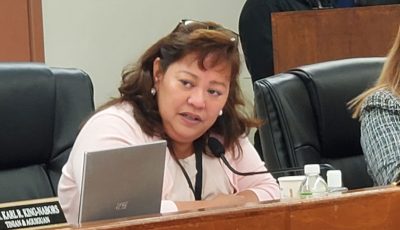Judiciary asks for $11.83M budget for FY 2022, or $7M more
Drug Court Division’s workforce reduced to 50%
The CNMI Judiciary has asked the Legislature for a fiscal year 2022 budget of $11,832,100, which is approximately $7 million more than what is currently allocated to the Judiciary.
CNMI Supreme Court Chief Justice Alexandro C. Castro and Superior Court Presiding Judge Roberto C. Naraja stated in their budget request that the $11.83 million is not outside their previous budget requests, and that this reflects what the Judiciary truly needs to run effectively.
In their budget request submitted early this month to Senate President Jude U. Hofschneider (R-Tinian) and House Speaker Edmund S. Villagomez (Ind-Saipan), Castro and Naraja said the Judiciary’s budget needs have taken a back seat for many years due to other issues in the CNMI. They said the lack of adequate funding has continuously strained judicial services and stretched employees extremely thin, both physically and mentally.
Castro and Naraja said these challenges were exacerbated by the shutdown of the heating ventilation and air-conditioning system at the Guma Hustisia, super typhoons Soudelor and Yutu, and now the COVID-19 pandemic.
“The domino effect of these challenges, coupled with economic downfall, resulted in dire hardships,” the chief justice and the presiding judge said.
For one, the Drug Court Division workforce has been halved and the program is currently operating on a skeletal flow. “The decrease in community supervision and monitoring of participants have resulted in an uptick of drug use relapses, which inevitably impacts families,” Castro and Naraja said.
This, they added, hinders the Judiciary’s commitment to adhere to the national trend of focusing on treatment-based methods and reducing punitive approaches.
Similarly, they said, the Family Court Division is burdened with heavy caseload with only two staff on board. “The effects of this reduction are felt by the most vulnerable in our community, as many involved in Family Court matters are unrepresented by lawyers,” Castro and Naraja said.
They noted that, as of February 2021, there are already 70 new family court cases filed, one-third of them being domestic violence.
In 2020, the Family Court Division witnessed an increase in the number of requests to place child support and alimony cases predating 2019 back on the Family Court docket due to clients’ inability to pay, they said.
Castro and Naraja said the Office of Adult Probation handles heavy caseload far exceeding the officer-to-offender ratio recommended by the American Probation and Parole Association, impacting public safety.
They said the Judiciary also lost employees on Rota and Tinian.
Despite these setbacks, they said they strive from day to day to carry out their constitutional duties and responsibilities and aim to enhance the justice system in line with national standards and developing legal trends.
They cited that the Judiciary hosted its language access training for court interpreters, court staff, and other agencies, and adopted various policies consistent with the Civil Rights Act of 1964.
In response to the pandemic, they said they quickly implemented telecourt hearings and enhanced technology to prevent interruption of judicial services.
Castro and Naraja said they also implemented an e-filing system for criminal and traffic cases.
Despite the shortage of staff, the Judiciary also opened a help center to assist the public with navigating new COVID-19 protocols.
“In sum, the Judiciary exemplified agility, resilience, and flexibility by remaining open to change and growth in the face of adversity,” Castro and Naraja said.
They said the fiscal year 2022 budget call issued by the Office of Management and Budget “is alarming.”
“The Judiciary is not a department within the Executive Branch. It is a third branch of our government tasked with a heavy burden of ensuring the rule of law is maintained on Saipan, Tinian, and Rota,” they pointed out.
Castro and Naraja said they are cognizant that the CNMI is facing unprecedented economic and public health challenges, but that it is their solemn duty to submit a request that accurately reflects the needs of the court, notwithstanding the circumstances.
They asked the Legislature to approve their budget request and give them the flexibility to move the funds from one category to another to address their urgent needs from time to time.





























